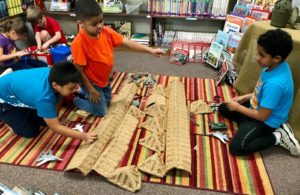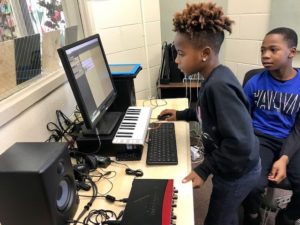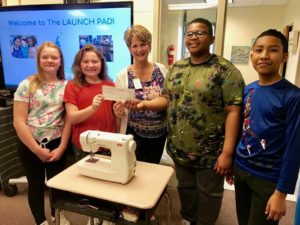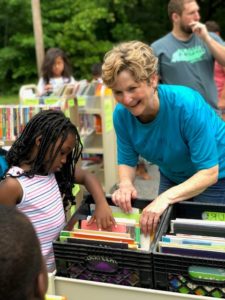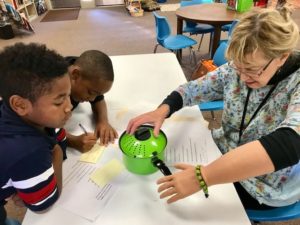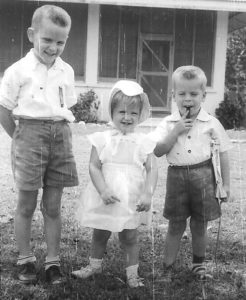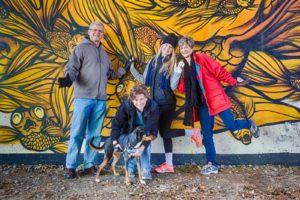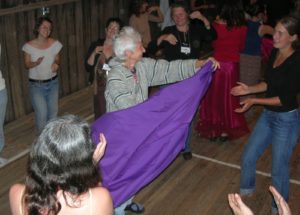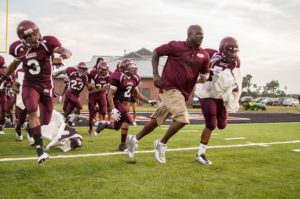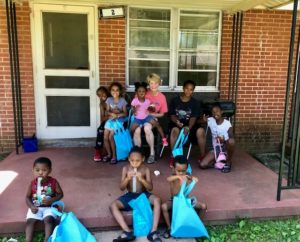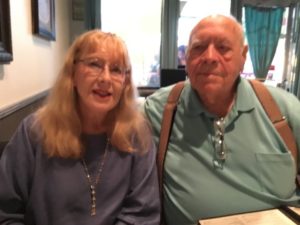A Conversation with Joshua and Sara Wieda: Their Winding Trails to St. Paul’s
By Joan Doggrell
Josh, Sara, Gwen and Tallis Wieda joined Don and me for pizza one evening. We had a wonderful conversation about religion in general, their previous experiences, and St. Paul’s.
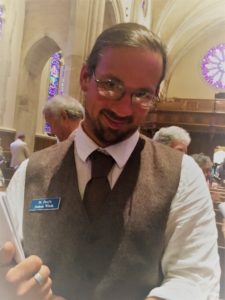
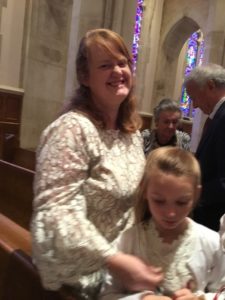 Josh and Sara love St. Paul’s and are strongly committed to this parish. But why they love it, and how they came to feel that they were home at last, are two different tales.
Josh and Sara love St. Paul’s and are strongly committed to this parish. But why they love it, and how they came to feel that they were home at last, are two different tales.
Josh arrived having had little experience with organized religion and church in general. Sara had attended the Methodist church as a child, and then as an adult, accompanied her mother on a quest for the “right” church.
Josh likes to say that Sam Kinison was his first confessor. “That was simply the way I was raised,” he said. “Everyone who knows who he is will already be in on the joke.”
Well, I vaguely remember Sam Kinison, but I didn’t get the joke. So I looked him up.
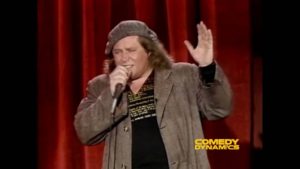 According to Wikipedia, “Kinison played on his former role as a Bible-preaching evangelist, taking satirical and sacrilegious shots at the Bible, Christianity and famous Christian evangelist scandals of his day. Kinison’s daring comedy helped shoot him to stardom . . . On several videos of his stand-up routines, a shot of his personalized license plate reveals the words ‘EX REV.’”
According to Wikipedia, “Kinison played on his former role as a Bible-preaching evangelist, taking satirical and sacrilegious shots at the Bible, Christianity and famous Christian evangelist scandals of his day. Kinison’s daring comedy helped shoot him to stardom . . . On several videos of his stand-up routines, a shot of his personalized license plate reveals the words ‘EX REV.’”
Kinison died in an automobile accident on April 10, 1992. His epitaph reads “In another time and place he would have been called prophet.”
OK, I think I get it now.
When you see him in church with his beautiful family, it’s hard to associate Josh with a raunchy comedian. But St. Paul’s does things to people….
Over pizza, with their girls exploring our house and yard, Josh and Sara told their stories. What follows is an almost word-for-word rendition of what they had to say.
Josh: We knew about St. Paul’s when I was going with the Girl Scout troop that meets there. I’ve got pictures going back several years of our daughter Gwen playing on the playground. Even then, I was moved enough by the sanctuary that I took pictures. I’d never seen anything like it. It’s such an unusual space – it has such a life to it. Most of the churches I’ve been to have this clinical sterility to them..
Sara: That applies to the Methodist church that I left, probably when I was twelve. I was confirmed in the Methodist church. And then after my parents split, my mother started taking me to Baptist churches, which led me to not going to churches at all for many years.
Joan: Why was that?
Sara: She thought it would be fun to bring me to a “cool” church, that I would buy into it more, because I didn’t really like the Baptist thing. The purity movement was the thing in the nineties. I thought it was creepy, bizarre and weird, and I hated it. So the church Mom brought me to had a skateboard park behind it. The Youth Minister referred to the crucifixion of our Lord as “Jesus’s big wipeout.”
Years pass and we have the girls – my mother has bugged us forever. She told us we were setting a bad example. I would go to her churches for just Easter and Christmas. But she finally wore me down. She said I could pick any church I wanted to go to – as long as it wasn’t a cult.
Josh: So the first thing we did was go on line and look up churches that were cults. We found the only church in the region that didn’t have a support group for its own survival – and that was us poor Episcopalians. Though I guess there is coffee hour!
Sara: Kidding aside, I did a lot of research – she was not going to let up. She had a point. I was worried that if the girls didn’t get enough exposure to something, then the first bozo who walked up could just tell them anything. I wanted the narrative to come from us. I wanted to find churches that were more liturgy-based. That was important to me. The Methodist church was liturgy-based, but at the Baptist churches my Mom tried to drag me to, members of the congregation would eat Kentucky Fried Chicken in church, and bags of chips – to me it was really bizarre – I hated it. I wanted to find something more closely aligned with “out-of-church morals,” like affirming to people in general.
Josh: They don’t talk about there being a “religious left.” That’s a compliment, as opposed to the religious right. I’m kind of tickled by how much my experience is so different but so much like Sara’s. Both my parents came from Catholic families – traditionally Catholic – immigrant families both – Polish and Hungarian and Catholic-German. But I never had any exposure to the Catholic Church – never saw the liturgy, no one ever talked about it. I think my father left the church at a very early age. He was pretty cynical about all religion. And I think all the children in our family inherited that.
My mother did the window-shopping Protestant thing. She would hop from church to church – I was young, so I didn’t know what she was looking for. But it was so strange going to St. Paul’s not knowing what to expect. I know enough about the people – we have a lot of cradle Episcopalians, but we also have a lot of refugees from the Baptists, the Catholics, the odd Methodist or Presbyterian. But to be somebody completely unchurched is kind of a treat. And there was something about walking into St. Paul’s and experiencing – the only analogy I can think of to use is what my father used to tell me about. Aunt Janice’s smoking habit. She started smoking when she was 17 years old. She said after her first drag, “This is what I’ve been missing all my life.” I wish I had a better analogy. It’s almost like 1500 years of Catholic generations going back to Clovis – it’s in the blood. The liturgy spoke to me. I’d never experienced anything like it in my life.
And the Communion – I’d seen it done in churches before. They have the little blister packs, a tiny cup, a little piece of bread in a zip-lock bag – that is so sanitary it has no meaning whatsoever. It’s the ritual of it that is just so powerful. You use your imagination – you can participate in what people have been doing all this time. Two thousand years of people breaking bread and sharing wine together goes back to the first table. And I’ve been hooked ever since.
I’ve had the occasion to talk to Hazel about it several times. The feeling I explained to her that it was a feeling of coming home, of recognizing a place you’ve never been before.
There are people who are hungry for something substantive, and they’re not finding it.
I fell in love with the people at St. Paul’s first. Our person was Wendy Llosa. I don’t think we were there ninety minutes before we heard, “Welcome! Want a job?” I think that’s important – not merely the welcoming – and I’ve heard the horror stories – but if you invite someone to be a part of something – to do the work. That is what the difference is between church and family – in family you do the dishes.
It’s authenticity – that’s the buzz word. I think the secret ingredient is authenticity.
Joan: People who are living out their faith. That’s what we found. Especially when Don got so sick. They were right there. Bill Tudor and Lee Daniel…
Josh: We’ve only been at St. Paul’s a couple of years now, and Sara has her story about people showing up and offering themselves – when your car broke down . . .
Sara: Oh yeah.
Josh: Inside of 15 minutes after she posted the picture on Facebook – so from breakdown to post, three parishioners asked her if she needed help, and said they were on their way.
Sara: Sarah Crow came to rescue me. The tow truck beat her. Jane Huskison called me – I feel there were others – they said, I hear you broke down – I’ll come and get you. It was not a “Please come and rescue me” post. It was several cuss words long. They called me right away when they saw it. Can I help you? Sarah Crow got about halfway there when the tow truck arrived.
Josh: And the critical thing – you can get that other places – but no one told them to do it. It wasn’t, “The pastor called me and now I’m on my way.” It was so sincere.
Joan: The church is supposed to do something for you? But wait a minute. We are the church.
Sara: Sure, that kind of caring is in other places. I’ve just never felt it. I think in all the other churches I went to – some of it was probably my own bad attitude – including Mom’s cool surfer church – but those people never had a reason to make a connection to me because I thought they were all weird. I wasn’t about to pop open a bag of chips in church. That wasn’t my place, and for some people, that makes them happy. It didn’t make me happy.
Josh: We are called to be all things to all people – I just don’t feel called to be the person who eats KFC in church!
Josh: My mother’s family all converted to Jehovah Witnesses – but she was the only one who didn’t go for it. She was a very talented debater. She would get a visit from the Jehovah Witnesses and invite them into the house and ambush them. Jehovah’s Witnesses are taught that if you’re talking to someone that you can’t win an argument with, you are talking with the Devil. It’s a side of her that I wish I had gotten to see more of.
Josh: I am in my first year of education for the ministry, the EFM curriculum. It’s my first church experience getting to know the scripture without treating it as literal and unassailable – just this thing you have to handle with kid gloves. I never knew what I found so off-putting – it’s idol worship. You have people almost literally rubbing the doorpost of their houses with the Bible. It anyone invokes the Bible in this way, it’s always a closed Bible, as if the book itself has magical power. I think Kyle articulated it very well when he said it is the story of an experience. And the thing I find most critically important about the Bible is – the Israelites didn’t have one. There is logic trapped.
Joan: They did have the Torah.
Josh: Some were writing it, and some were living it. In Jesus’s case, I like to think he was breaking it open. One of the things we are discussing in EFM – you have the Law that was for the people of Israel. And if you are of and in Israel, it’s a wonderful way to live. But maybe you can open this up and give it to the whole world.
It seems to me that good people and bad people can never identify each other because good and evil both want the same thing, but evil only wants it for itself. Good people want it for everyone. I think that’s really the message of the Gospel, that whatever it is that affirms life has to do so for everyone. Not just your own, not just for yours. I think is especially true these days, while we’re learning that the hard way, where I see so many people digging their heels in, very clearly separating us from them. The Episcopal church is the only place I’ve seen a Jesus that actually walked his talk. Because I could never follow how so many of the other people I met had arrived at the conclusions they did based on the same narrative, the same record, For example, I don’t understand the politics of a lot of evangelicals. But I think the critical thing is, I don’t think it matters as much what we do as why. If you get to the point where you understand that somebody is acting out of love, love for their neighbor or family, the conversation becomes how best to live that love. The conversation breaks down when you decide who you have to love. Who is my neighbor?
Joan: That question is central, I think, to the whole Christian belief.
Josh: There is a wrong reason to build a bridge and a right reason to build a wall. You can tell who is on the right side of that issue by who is doing it for everyone.
Speaking truth to power is a concept I was acquainted with. I have a persistent experience of discovering the divine in things that are mundane or even profane. I have a theory that prophets, philosophers, and stand-up comedians occupy the same ecological niche in history. I think they are all, in their given time and place, people who speak truth to power. What is the 20th century equivalent of running alongside of the chariot? Maybe Lennie Bruce was on to something. Who knows? So I am trying to find these things in this interesting upbringing of mine where maybe there’s a wrong way to say the right thing.
That’s another thing. I was used to thinking of the church as almost a cult of personality, like a house where a pastor delivers a message and people come to hear it and then they go. I don’t know if “empowerment” is the right word. The word they use is “commission.” I think it’s the best word to use. We have a call, a commission to actually go out and do the things we’re told, that we are shown how to love other people.
Of all the places to hear somebody articulating what the problem in our society is … I got to see Eddie Izard recently, another stand-up comedian, speaking of the state of the world. Take an event like World War Two. Sixty million people showed up to fight that war. How many gods showed up? I’m listening to this, and I finally get it. God did show up – 60 million times. Every time somebody stepped in front of a bullet, every time somebody went out there and did what was called for, put themselves out there in the name of love. And of course the Devil showed up too because there were people out there for that also. The way it becomes real – this isn’t just lip service, just a Sunday morning mood. This is something you’re supposed to . . .
Joan: Live out. I think you have discovered something profound.
Josh: For somebody who took the nonexistence of God for granted for most of his adult life, it’s almost – there’s really no way to articulate it. It’s a deep sense of being ready. It’s the willingness to acknowledge the unknowable. Most of the atheists I’ve known were so certain of everything. That was the basis of their unwillingness to depart from what they could see and hear and touch. You don’t have to deny your senses. You need to be prepared to acknowledge that maybe there’s something behind them, deeper. The way I heard it put, that I thought was the best, is that other places have unquestioning answers, and we have unanswered questions. I think that’s going to be the door that lets people experience this again. So many people are sick of being told what to think and how they’re supposed to live, and they’re judged and stepped on. They’re told, “Get the hell out of here if you don’t want to do it our way” But I think you have to look for God everywhere because it’s the only place big enough to find her.
It would definitely be a hard thing to leave now.
Joan: Sara? Do you have anything to add?
Sara: Sounds like Josh went over both our feelings about the church.
Josh: Well it’s an interview . . . she can do the follow-up.
Sara: The liturgy, the serious approach. The worship is important to me, but not to take yourself so seriously. It seems like it was the reverse in my previous experience. Don’t take yourself seriously in church – we’re going to Six Flags over Jesus. When you go out, God forbid you drink beer. I just didn’t enjoy it. I had several reasons why I didn’t go to church for several years. Before I came to St. Paul’s, the last time I remember enjoying church was at my dad’s church — the big Methodist church in Opelika – this big castle-like church. It has this big belfry. In the back of the church was an old unused choir loft. My favorite thing to do was go up there after Sunday School and throw grapes at the ladies. I tried to get them in the hats. I was probably six. That’s the only time I remember enjoying church.
Josh: That’s why Tallis isn’t allowed in the choir loft!
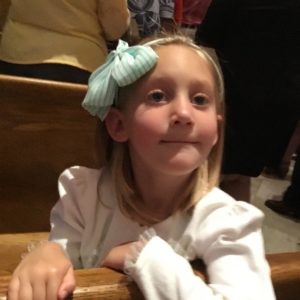 Joan: Grape-throwing might be hereditary!
Joan: Grape-throwing might be hereditary!
Sara: Church wasn’t my thing. But now I’ve found something I can participate in because everyone participates in the liturgy. You’re not just sitting there with someone speaking at you, which was important to me.
It’s also important to me that the girls have Hazel as a role model. It’s amazing to me, because my mom comes from a long line of Baptists where women couldn’t speak in church. They could only hold women’s Sunday Schools.
Josh: I was privileged to overhear the kids arguing – usually it’s over something silly – but Gwen was explaining heatedly, “Tallis, don’t be dumb! Boys can’t be priests!”
Sara: It’s so wonderful they get to have that experience.
Sara: There are so many things people do that you don’t have to do. For instance, not everybody makes the sign of the cross or genuflects. You can make God gender neutral. Even in the service, there are shades of gray, what people feel comfortable participating in. I swear, if I ever saw my Mom make the sign of the cross, I might fall over dead.
Josh: Sara has adopted a head covering.
Sara: Well, Mary Rose was doing it, and I read a book by a woman who was raised evangelical and converted to Episcopalianism later. But she had written a book about how she wanted to try to live a year based on literal Biblical principles. She wanted to see what experiences changed her for the better and what didn’t. A lot of the time, she wrote, this is just crap! But two things stuck out: she started covering her hair all the time because they mention it in the Bible. She said the thing she liked about it was almost a tangible, visible reminder to her while she was out, just to be respectful and gracious. She said it changed her mindset. She became less coarse in her interactions with other people. So I said, I’m going to try it too. I do feel it works for me. I feel people are seeing me differently, and it makes me more mindful when I’m out. It’s kind of a tangible reminder for me.
Joan: I guess my Daughters of the King cross serves that function for me.
Sara: I don’t wear the head covering at home. But I’ve really enjoyed wearing it while I’m out. I started at the beginning of summer, and I’ve done it since. They haven’t really asked me about it at school yet. Mary Rose pointed me in some directions. It’s more to be gracious to other people.
And then it was time to say goodbye – to a wonderful evening and inspiring people!
